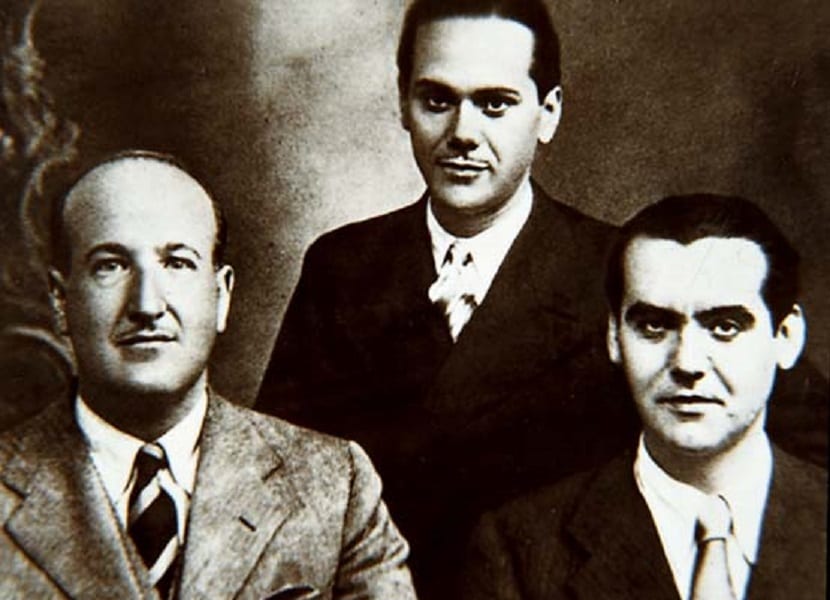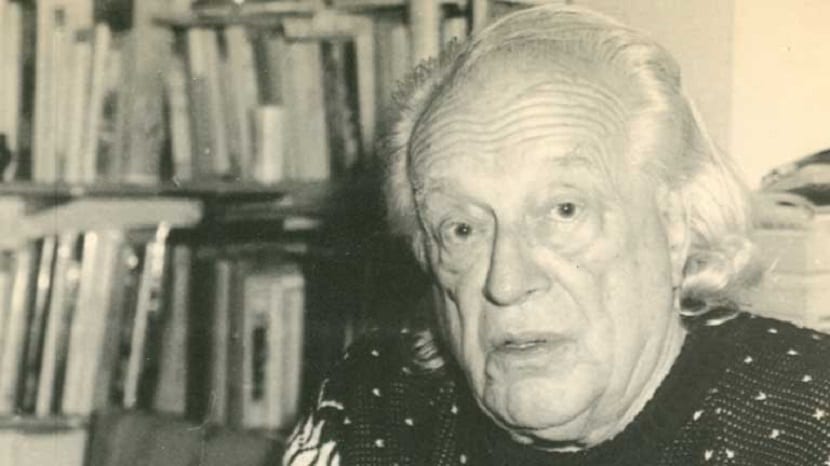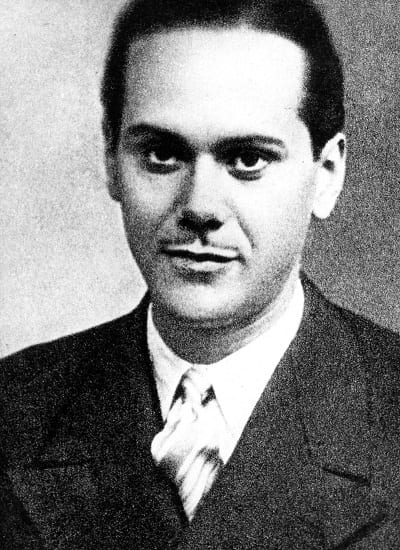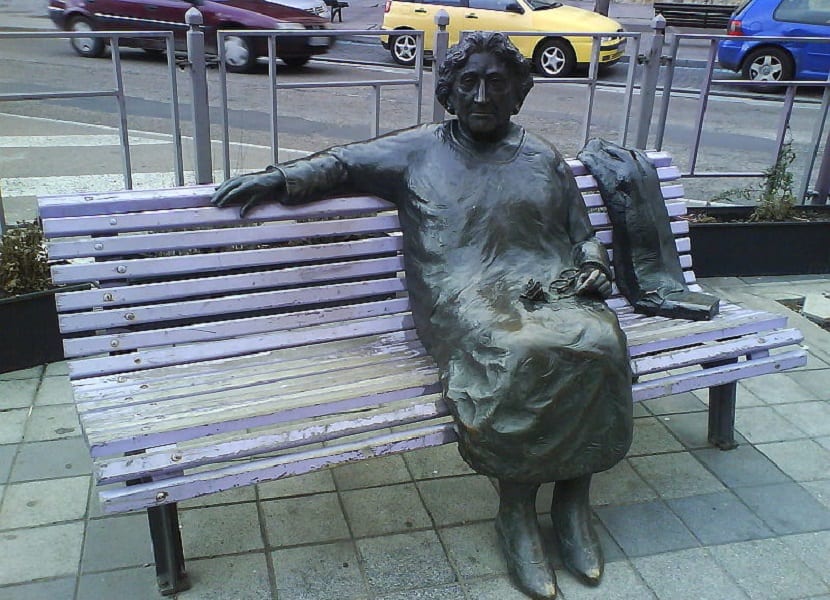Today April 14 day, on the occasion of the memory of II Republic, we wanted to make a special compilation with those great authors of the Spanish Republic. Surely you know all these names that we will see below, most of them, poets. What is also certain that once you read their names you will locate them perfectly at that time.
The most popular are Pedro Salinas, Rafael Alberti, Luis Cernuda, Jorge Guillén, Federico García Lorca, ... But there are many others, not so well known, who also had their history in that small but intense period of time, and also suffered the consequences of being Republicans at this time. Let's go one by one!
Rafael Alberti Merello
Rafael Alberti Merello Cádiz poet Born at the end of 1902, he was a painter at the beginning, in fact, he moved to Madrid in order to dedicate himself body and soul to painting, until he realized that what he was really worth was poetry.
Regarding the politics of that time, Alberti joined the Communist Party of Spain in 1931, which led him to travel to different countries such as the USSR, France or Germany and make friendships more or less akin to his political condition, and a year before the start of the civil war he actively participated with the Popular Front's political campaign. Once the war started, he was not one of the writers who backed down, on the contrary, at that time he was in Ibiza and did everything possible to move to Madrid and offer his collaboration to the Republican Government, finally participating with the 5th Regiment. From this experience he drew a large part of his books: "The explosive donkey", "High tide", "Between prison and the sword", etc.
It was also member of the Alliance of Antifascist Intellectuals along with other authors such as María Zambrano, Ramón Gómez de la Serna, Rosa Chacel, Miguel Hernández, José Bergamín, Luis Cernuda or Luis Buñuel among others (we will talk about some of these later).
Once the Republic is defeated, Alberti opts for exile together with his wife María Teresa León, living years later in places like Marseille, Buenos Aires or Rome.
And more entering the literary, some of his great works are:
- "Sailor ashore" (1925)
- "About the angels" (1929)
- "Slogans" (1933)
- "Verses of agitation" (1935)
- "Coplas of Juan Panadero" (1949)
- "Buenos Aires in Chinese ink" (1952)
- "Slow roll for the death of Stalin" (1953)
- «Rome, danger for walkers» (1968)
- "Individual verses of each day" (1982)
- "Accident. Hospital poems » (1987)
- "Songs for Altair" (1989).
- "The Spanish poet Rafael Alberti recites poems by Federico García Lorca" (1961).
He belonged to the well-known literary movement such as the Generation of 27 and received the Miguel de Cervantes Award in 1983.
Federico Garcia Lorca
In this blog of Actualidad Literatura I will have dedicated about two or three articles to this great poet from Granada and little or nothing remains for me to say about him that is no longer known. Only he was one more victim of a different political condition from the leaders of that time. If you want to read more about this great author who was vilely murdered, here is the list of articles dedicated to him:
- New investigations into the murder of Federico García Lorca.
- Andalusian poets V: Federico García Lorca.
- 78 years of the murder of Federico García Lorca.
- Police documents confirm the murder of Lorca by homosexual.
Antonio Buero Vallejo placeholder image
Antonio Buero Vallejo was also writer during the time of the Second Republic, specifically playwright and poet. He was born in Guadalajara and, as with Alberti, he left painting to dedicate himself to writing. His literature belonged to 'Symbolism' movement, of which one of the great teachers was Edgar Allan Poe.
Such was his involvement in the Spanish civil war (he was a member of the FUE) that at the end of this he was sentenced to death. Buero Vallejo was finally exiled to Madrid, after going through countless prisons. This time he used it well to write certain literary works and paint pictures and portraits, among them, one of Miguel Hernández (great friend) who still have his heirs.
Their most notable works are: "In the burning darkness" (goes about blindness) e «History of a staircase».
Their distinctions y Awards are:
- Gold Medal for Merit in Fine Arts.
- Lope de Vega Award (1948).
- National Theater Award (1980).
- Miguel de Cervantes Award (1986).
- National Prize for Spanish Letters (1996).
Luis Cernuda
This Sevillian poet of the Generation of 27, together with Federico García Lorca and Rafael Alberti, among others, also formed part of the republican side during the Spanish Civil War. He participated in numerous propaganda and political acts in favor of the Republic, and at the end of the war he had to go into exile in countries such as Great Britain, the United States or Mexico (where he died). It was in these countries that he dedicated his time as a professor of literature and literary critic.
The most recurrent literary themes in the works of Luis Cernuda are:
- La loneliness and isolation.
- El feeling of being different with respect to the others.
- La need to find a better world free from repression.
- El love in different variants: unenjoyed love, unsatisfied love, etc.
- The wish of the perennial youth and the passage of time.
- La nature.
He wrote a heartfelt elegy to Federico García Lorca, when he learns of his death, entitled "To a dead poet."
Rose Chacel
Unfortunately, a writer very little known and studied in literature manuals of schools and institutes. Rosa Chacel was a Valladolid writer born in 1898, specifically belonging to the Generation of the 27.
During the time prior to the Spanish Civil War, Chacel collaborated with the left wing by making demonstrations and calls at the same time that he was dedicated to his profession, a nurse.
His most notable works in terms of novel are:
- "Station. Round trip" (1930)
- "Teresa" (1941)
- "Memories of Leticia Valle" (1945)
- "The Unreason" (1960)
- "Barrio de Maravillas" (1976)
- "Novels Before Time" (1971)
- "Acropolis" (1984)
- "Natural Sciences" (1988)
He also wrote short stories, essays, translations, and poetry. It should be noted of this last genre, "At the edge of a well", poem dedicated to his mother and with prologue from another great of literature: Juan Ramon Jimenez.
Peter Salinas
Born in 1891 in Madrid, he dedicated himself to studying Law and Philosophy and Letters. As a curious fact is that he had Luis Cernuda as a student at the University of Seville where he exercised once he obtained the chair.
He was another of the authors exiled from our country once the War was over and his third stage of literary creation coincided exactly with this exile. This is when he publishes the works "The one contemplated" (1946), dedicated to the sea of Puerto Rico, "Everything clearer" (1949) and "Confidence".
One of the highlights of Salinas's poetic literature is the dialogue that he establishes in his verses with himself, with the world in general, with his beloved, with his land or with the sea. It is something that distinguishes it from many. He was one of the poets who when he spoke of love in his verses did so in an anti-romantic way, free from all possible sentimentality, playing a lot with irony.
Pedro Salinas finally died in 1951 in the city of Boston.
Some more writers
And there are many more considered authors of the Spanish Republic, but it would give us two or three articles like this one. Stand out Miguel Hernandez, Jorge Guillen, Damaso Alonso, Vicente Aleixandre, Emilio Prado, Miguel Delibes (who was still caught by the war young man), etc.
That is why I would like to include you a video that talks about that time, specifically about the authors of the Generation of 27 who were possibly the ones who most accused the consequences of the Spanish Civil War.
As long as the memory exists, the names of these authors will not disappear.




The quality and quantity of articles that you produce in such a short time is impressive, it is really an enriching experience to read. Many thanks.
Thank you very much Jose for the affection that you transmit to me in each of your comments… It is a pleasure to do a job and receive such compliments, but I do not deserve them… Thank you again!